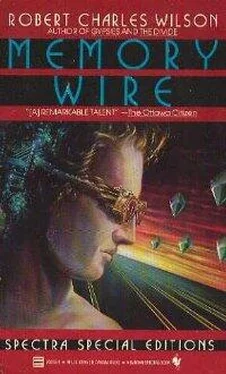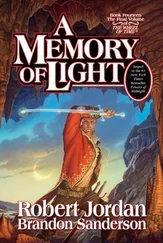Robert Wilson - Memory Wire
Здесь есть возможность читать онлайн «Robert Wilson - Memory Wire» весь текст электронной книги совершенно бесплатно (целиком полную версию без сокращений). В некоторых случаях можно слушать аудио, скачать через торрент в формате fb2 и присутствует краткое содержание. Год выпуска: 1987, ISBN: 1987, Издательство: Bantam Spectra, Жанр: Фантастика и фэнтези, на английском языке. Описание произведения, (предисловие) а так же отзывы посетителей доступны на портале библиотеки ЛибКат.
- Название:Memory Wire
- Автор:
- Издательство:Bantam Spectra
- Жанр:
- Год:1987
- ISBN:978-0-553-26853-9
- Рейтинг книги:4 / 5. Голосов: 1
-
Избранное:Добавить в избранное
- Отзывы:
-
Ваша оценка:
- 80
- 1
- 2
- 3
- 4
- 5
Memory Wire: краткое содержание, описание и аннотация
Предлагаем к чтению аннотацию, описание, краткое содержание или предисловие (зависит от того, что написал сам автор книги «Memory Wire»). Если вы не нашли необходимую информацию о книге — напишите в комментариях, мы постараемся отыскать её.
Memory Wire — читать онлайн бесплатно полную книгу (весь текст) целиком
Ниже представлен текст книги, разбитый по страницам. Система сохранения места последней прочитанной страницы, позволяет с удобством читать онлайн бесплатно книгу «Memory Wire», без необходимости каждый раз заново искать на чём Вы остановились. Поставьте закладку, и сможете в любой момент перейти на страницу, на которой закончили чтение.
Интервал:
Закладка:
Byron considered. It must have happened shortly after they left for Brazil. Not, he thought, coincidence.
“They even raided some places in the Floats,” Montoya said. “Very rough time. Some good people were up in Carmel when the hammer came down.” He shook his head.
“They took Wexler?”
Montoya’s eyes narrowed; he licked his lips. “It’s not that I don’t trust you, right? But could be somebody asked you to ask.”
Byron took hold of the camera lens, forced it left and right on its rusted pivot. “Do you see anybody?”
“Ask Cat,” Montoya said, and cleared the monitor.
“Cat” Katsuma was a petite second-generation Floater who did crystal paintings for the mainland galleries. She had known Byron and Teresa for years; she expressed her pleasure at seeing him again. “I heard bad rumors,” she said. “I’m glad you’re okay.”
“Reasonably okay,” Byron said. “Tell me about Wexler.”
“You really need to talk to him?”
“It would clear some things up.” Though the prospect of money had retreated.
“Well. Meet me this afternoon, then,” and she named a cafe by the sea wall south of the factories.
He figured Wexler owed him—minimum—an explanation.
Running south in the rental barque, he totaled up everything he knew about Cruz Wexler.
Much of it was public knowledge. Wexler was, or had been, a celebrity. During the war years crystal ’liths had begun to circulate in the drug underground; they enjoyed a kind of vogue during which public curiosity had peaked. Wexler held a Ph.D. in Chaotic Dynamics but had been cashiered when he began publishing articles in which he described the dreamstones as “psychic manna from an older and saner civilization.” He lost his tenure but gained a following. He had been prominent in bohemian circles for a few years, had once owned property in the Floats. But the notoriety subsided and Wexler had pretty much retired to his estate in Carmel these days, fighting a progressive emphysema and playing wise man to the stubbornly faithful. He still had a following among the Float artists who drew their inspiration from the stones. Periodically they would make the migration to Carmel, bask in his presumed enlightenment. Byron figured it was pretty much all bullshit. But it was Wexler who had underwritten his lab, and it was Wexler—if anyone—who could make sense of the Pau Seco debacle.
He moored his boat at a by-the-hour dock behind the ruin of a cracking plant and walked to the cafe Cat had specified. It was a dicey neighborhood. Not terrible, but you got a certain influx from the slums farther south. Inside the chain-link perimeter he recognized Cat sitting at a high table overlooking the canal. A man was with her. The man had a Navy cap pulled down over his ears and a few days growth of beard, but it was Wexler; he was not hard to recognize. Byron, nervous and focused now, ordered a beer and carried it to the table.
“Byron,” Cat said warmly.
But he was staring at Wexler. Wexler said nothing, only returned the look. His eyes were steady and blue. Still a charismatic figure. People didn’t believe he could lie with eyes like that.
His breath rasped in, rasped out.
Cat stood up, sighing. “I’ll talk to you later, then.” She touched Byron’s shoulder, leaned over him. “Go easy on him, all right? I’ve been bunking him in my float. He’s got nowhere to go and his lungs are pretty bad.”
When she was out of earshot, Byron said tonelessly, “I have every reason to believe you fucked us over.”
Wexler nodded. “I can see how you might feel that way.”
“A walk, you said. A vacation.”
“Unforeseen circumstances,” Wexler said. “Is Teresa all right?”
“More or less.” He resented the question. “You have the stone?”
No, Byron thought. You are not entitled to that datum. Not yet. He smiled. “Worry about it,” he said.
Wexler sat back and sipped his coffee. “I’m not here,” he said at last—meaning the Floats, Byron took it—“by choice. You might have noticed.”
“Cat said you got burned.”
“They came in force. I was not expecting it.”
“But you weren’t home? That’s a pretty good coincidence.”
“I didn’t expect any of this. Or I would not have sent you people south. May I explain, or would you prefer to break my nose?”
Byron realized his fists were clenched. More bullshit, he thought bleakly. But he might as well listen. And he realized then that he had come here not for money or satisfaction, but for Teresa’s sake. Her unhappiness was patent and frightening and connected very closely with the stone. If anybody understood it, Wexler might.
A gull circled overhead, screeching. Byron tossed a crumb from the table and watched the bird chase it down to the dark canal water. “I’m listening,” he said.
The Agencies came and closed the estate, Wexler said. It was a radical sweep. They had always ignored him before. The dreamstones were technically contraband, but it was a law not much enforced; the scale of the crime was minuscule, and intensive enforcement would not have been cost-effective. “The new ’liths changed their mind,” Wexler said. “The deep-core ’liths.”
“You knew,” Byron said.
“I was warned,” he admitted. “I have my own contacts. Obviously.”
“Some good people were there.”
“There was no time to get them out. They’ve been in custody, but my understanding is that they’ll be released soon.” He sipped his coffee, labored for breath. “You have to understand about the stones.”
Wexler had a contact in the government research facility in Virginia, a highly-placed member of the research team who had been feeding him news about the deep-core oneiroliths. “And it was heady information. You have to understand that. It was everything we wanted. Everything that came before, impressive as it was, was blurred or obscure by comparison. For years we’d been decoding data in which every third bit had been erased by time. Reconstructing it, really. Even so, we learned a great deal. But never anything substantial about the Exotics themselves. As if they were holding themselves aloof, standing out of reach.”
But now, Wexler said, the data came in torrents. Too, the Virginia team had begun serious work with what they called “the human interface”—mostly convicts recruited out of Vacaville. This was not hard data; it was “of dubious provenance” and sometimes contradictory. But much of it correlated with the new translations from the big mainframes. A preliminary understanding of the Exotics began to emerge.
“The question had always been, why do we have these artifacts? Why were they buried in the Mato Grosso? Were they a gift, an accident? The great mystery.”
Byron said, “Is there an answer?”
“Hints,” Wexler said. He leaned forward now. His own fascination was obvious and undimmed. “We deciphered a little of their history. The history, especially, of their information technology.”
“I don’t understand,” Byron said.
“Well…” Wexler paused to catch his breath. “First there are the stories around the fire. Neolithic data storage. The past is recorded, but it’s not very efficient. Errors creep in. Then the written word. The beginning of real history—
a better grip on the past. Compared to oral history it’s a fairly dense medium, fairly incorruptible. Then the printed word, the book. Better yet. Photography, audiotape, videotape… and suddenly the past is very much with us. We have digital technology, we have molecular memory. We have people like you.” He looked a moment at Byron’s faded Angel tattoo. “Walking data storage. The Exotics were like us in this respect, but more focused… you might say obsessed. The idea of the loss of the past terrified them. They had a profound, ontological fear of forgetting. Without memory, no meaning; without meaning—chaos.” He sat back. “The oneiroliths are the logical product of that obsession: complexly folded in spacetime, linked somehow directly into sapient consciousness. You could say that they contain a sort of recording of experience itself, an archive of every human life since they arrived on this planet. Better perhaps to say that they allow us access to the experience of the past—the only kind of time machine we are ever likely to have.”
Читать дальшеИнтервал:
Закладка:
Похожие книги на «Memory Wire»
Представляем Вашему вниманию похожие книги на «Memory Wire» списком для выбора. Мы отобрали схожую по названию и смыслу литературу в надежде предоставить читателям больше вариантов отыскать новые, интересные, ещё непрочитанные произведения.
Обсуждение, отзывы о книге «Memory Wire» и просто собственные мнения читателей. Оставьте ваши комментарии, напишите, что Вы думаете о произведении, его смысле или главных героях. Укажите что конкретно понравилось, а что нет, и почему Вы так считаете.












